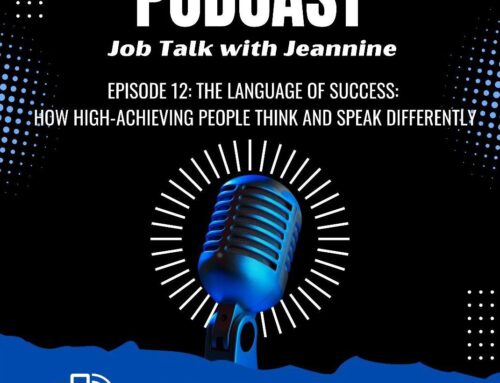
ABCs of Work: X-ing Out the Bad Stuff
Job seekers, a lot of information is available about what makes for a good resume. Most tell you what to include, but few tell you what to leave out, so grab your resume because you’ve got some crossing out to do! Nervous? Don’t be; remember, the goal is “x-ing out the bad so you can focus on the good!”
Here are five things you should remove from your resume today to be competitive in the modern job market.
Objectives
Objectives are a waste of good resume space. I see this glaring issue at the top of many resumes under the individual’s name, and I cringe every time I see it. Once an excellent resume opener, it has become a telltale sign that you have not kept up with the times.
Bottom line, the objective of every job seeker is to get a job, period. Prospective employers don’t really care; the tough pill, no one really cares. Go ahead and remove the objective and any reference to seeking a job where you desire a rewarding position that allows you to grow with the company.
Instead, use that precious resume space to write a short summary demonstrating your value. If you focus on your expertise and the skills you offer, you give the prospective employer a glimpse of what you can do for them. Best of all, this approach will motivate the reviewer to actually read the rest of your resume.
Too Much Information

Sharing too much information is another item on my cringe list. Listen, I get it. We all get emotionally attached to the great things we have done in our careers. I’ll even fess up to one item I struggled to remove from my professional resume when I was a job seeker: an award-winning project I did for NASA. Why? Because it was NASA and that stands for innovation, right? Truthfully, the technology no longer exists, making that project irrelevant today. The good news is if I was a job seeker today, I could still use that experience to answer the question: “Tell me about a time when you worked on a cool project?”
The goal of the resume is to share information from your career history relevant to the job you are seeking. It is not to create an HR manual for every position you have ever held. If you do a data dump of your entire work history, your resume will lose focus. The story you are trying to share will get lost, and the desired job will take significantly longer to acquire.
The information you share should focus on the past 10 years. If you are a seasoned worker with a long history of work experience, you can always note former roles in another resume section called Early Career History. In that early career section, list the organization, position, location, and dates. Do not include anything else. If the reviewer wants to know more about an older position, they can and most likely will ask you.
Title Inaccuracies

It is tempting to put an unofficial job title on your resume to align better with what you actually do at work, especially if it makes you the perfect fit for a job you are interested in; however, I caution you against the urge. Your resume is the first thing a prospective employer will receive from you. It serves as a first impression. It is better to be honest than to embellish and potentially get caught in a lie. Also, a prospective employer could call your former employer during the background check, so you want things to line up. If you are transitioning from the military, you can put your official title and, in parentheses, note an equivalent civilian role. For example, an officer in charge could translate to a director position in the civilian world. Still not sure how to translate your military work, contact me and we can discuss it.
Unnecessary Personal Information
 Technology has changed the way we live and work. It has also changed how we gain information and communicate. This has forced a change on the resume too. You no longer need to include your full home address except on a federal government resume. Snail mail is no longer sent anymore. Why? There are faster ways to contact you, so it is better to include your phone number, email, and LinkedIn profile URL.
Technology has changed the way we live and work. It has also changed how we gain information and communicate. This has forced a change on the resume too. You no longer need to include your full home address except on a federal government resume. Snail mail is no longer sent anymore. Why? There are faster ways to contact you, so it is better to include your phone number, email, and LinkedIn profile URL.
Also, don’t share any unnecessary personal information like your birthdate or family data. In the past, this information was used to help employers connect with candidates, but today, that information could cause an unwanted lawsuit for an employer. In fact, if a hiring manager sees that information, they will throw the resume away.
Miscellaneous Extras
 There are many miscellaneous things I have seen on resumes. The most common include photographs, references, and salary information. If a hiring manager sees a resume with a picture, they will toss it. I understand some countries require it, but if you live in the United States, do not include your photo on your resume. References are a thing of the past. If an employer requests your references, you will create a separate reference page containing those references. You will not add them directly to your resume.
There are many miscellaneous things I have seen on resumes. The most common include photographs, references, and salary information. If a hiring manager sees a resume with a picture, they will toss it. I understand some countries require it, but if you live in the United States, do not include your photo on your resume. References are a thing of the past. If an employer requests your references, you will create a separate reference page containing those references. You will not add them directly to your resume.
Most importantly, don’t put your salary information on your resume. If you do, your salary negotiation power goes right out the window. Now, I realize federal government resumes often will require salary information, which is okay, but traditional resumes going to employers in the civilian market do not include it.
Have any resume questions? Share in the comments, I am happy to answer your questions!
As always, I am cheering for you!

About Vision to Purpose

Dr. Jeannine Bennett is the founder and CEO of Vision to Purpose, an organization dedicated to helping individuals and businesses succeed by offering tailored career, business, and writing solutions.
Vision to Purpose specializes in helping people get jobs and writers become published authors! Need a resume writer? How about a writing coach? Perhaps a business consultant? Look no further; Dr. Bennett and the Vision to Purpose team can help! You can learn more about Vision to Purpose by visiting www.visiontopurpose.com.









